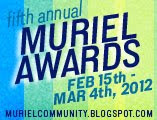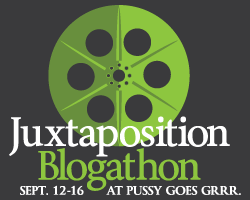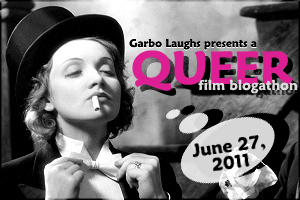The True/False has started in earnest, but I've still got a couple of films from the screening process to write about. As I was saying in my last post, there's a dichotomy at True/False between films with large-scale concerns and movies that have a much more narrow scope. Some of the films with a narrower scope are personal stories or accounts of quirks in the way the world works. These are sometimes the festival's most pleasurable films. Sometimes, they are the most unpleasant. Regardless, they're usually the most daring entries at any given festival. The fun part of festivals is the blindness surrounding these films. You pays your ticket and you takes your chances and good luck to you.
Friday, February 28, 2014
True/False 2014, Preliminaries: Acting Out
Posted by
Vulnavia Morbius
at
2:46 PM
0
comments
![]()
Labels: 2014, Actress (2014), documentaries, film festivals, films by women, True/False 2014, True/False Film Festival
Thursday, February 27, 2014
True/False 2014, Preliminaries: Every Cut is a Lie
The night before True/False opened, they launched their companion series, showing with the festival, of "neither/nor" films. This year's series features Iranian meta-cinema from the 1990s. True/False, as their name indicates, has always been fascinated by chimeras, films in which fact and fiction intermix. The documentary as a form has always been untrustworthy. It's a feature and a bug that goes all the way back to Robert Flaherty. Few films are as aware of this fact as Abbas Kairostami's Close-Up (1990), which launched this year's series. It's the ultimate chimera.
Posted by
Vulnavia Morbius
at
2:01 PM
0
comments
![]()
Labels: 2014, Close-up, True/False 2014, True/False Film Festival
Wednesday, February 26, 2014
True/False 2014, Preliminaries: Women and Men
The True/False film festival returns to my fair city this week. I've been to every edition of True/False in some capacity. The last two years, I've had the privilege of serving on the screening committee, so I've seen a few of the films playing at the festival already. As was the case last year, this didn't make picking my schedule any easier, but it does let me write about several movies ahead of the opening of festivities. As usual for True/False, there are a host of films that are overtly political mixed in among films with smaller and quirkier concerns. I used to think that True/False was curated with this in mind, but the zeitgeist in documentary filmmaking is self-assembling, even in the slush pile. No assembly required.
Posted by
Vulnavia Morbius
at
8:47 AM
0
comments
![]()
Labels: 2014, Big Men, documentaries, films by women, True/False 2014, True/False Film Festival, Ukraine is Not A Brothel
Sunday, February 23, 2014
Talkin' Roots Music Blues
I've been trying to write about the Coen Brothers' new film, Inside Llewyn Davis (2013) for weeks without success. The film is receding in my memory now so if I don't put something on (digital) paper now, I probably never will. It's not that the film is impenetrably obscure. It's not. It's as watchable as anything the Coens have made. It's just that it's also hermetically closed, a moebius strip of a movie. It's one that doesn't let you get close to it or hang a thesis on it. Maybe it's just me. In truth, this is a film that hit me at a low point. It wasn't a film that I really needed at the time, which makes my relationship to it so complicated that I don't know where to start.
I think the word that best describes Inside Llewyn Davis is "morose." It's a grey film filled with grey characters doing grey things in a grey world. It has a downer of an ending and a downer of a beginning--a given, since it ends where it begins. It's a portrait of disillusion and failure. Its protagonist, the eponymous Llewyn Davis, is depressed and angry and confused at the outset. It's a state of mind from which he never emerges during the film. It tends to make the experience of watching it less pleasurable than it might be, especially if one is experiencing some of the same existential crises as Davis.
Note, here there be spoylers.
Posted by
Vulnavia Morbius
at
10:42 AM
0
comments
![]()
Labels: 2013, Coen Brothers, Inside Llewyn Davis, music
Saturday, February 22, 2014
Netflix Roulette: The Extraordinary Adventures of Adèle Blanc-Sec
It's been a while since I gave the ol' Netflix Roulette Wheel a go. Spinning the wheel this weekend gave me The Extraordinary Adventures of Adèle Blanc-Sec (2010, directed by Luc Besson). Color me surprised. I'm a fan of the Jacques Tardi comics, but I had no idea that this film even existed. My surprise was tempered a bit by director Luc Besson. I'm not a fan. Be that as it may...
Posted by
Vulnavia Morbius
at
4:59 PM
0
comments
![]()
Labels: Fantasy, Netflix, The Extraordinary Adventures of Adèle Blanc-Sec
Thursday, February 13, 2014
The Play's The Thing
I don't have any deep insights into the death of Philip Seymour Hoffman beyond a vague distaste for the moralizing tone of some of its observers. It doesn't matter how he died. His family will grieve and then go on and sooner than you might think, the manner of his death will be outshone by what he did in life. This is the way these things happen. The shotgun does not outshine Nirvana. The needle does not outshine Hendrix. This is right and proper. I'm probably the wrong person to even be writing about Hoffman, because Hoffman has always been an actor who doesn't connect with me. I appreciate what he did, but my own tastes run to watching other people. This has nothing to do with his worth as an actor. He was very, very good at what he did.
According to the folks at my local art house, Hoffman appeared in more films to play their screens than anyone else other than Patricia Clarkson. They decided to send Hoffman off with a screening of his 2008 film, Synecdoche, New York, one of Charlie Kaufman's existential mindfucks. Given the way that the film maneuvers itself into a state of nothingness, it's likely the perfect film to stand as the actor's epitaph. It's a film I've resisted writing about, in part because I'm not sure how to encompass all of the thoughts it evokes. It's a film where its metacinematic structures create a vortex that sucks everything into it. More than that, it's a film that defies easy synopsis and forget about unpacking everything in it in the 1200 words of a blog post. Future film scholars will pore over feelies of this film like cyberpunk Talmudic scholars.
Posted by
Vulnavia Morbius
at
11:17 AM
0
comments
![]()
Labels: Synecdoche New York
Saturday, February 08, 2014
All Roads Lead To Rome
"Late one night the club was heaving, I saw a vampire move across the floor.
Old and white with a silver cane lusting for youth through the mirror."
--The Mekons, "Club Mekon."
I stayed to the end of the credits of The Great Beauty (2013, directed by Paolo Sorrentino). The end credits wander lazily down the Tiber, coming to rest, eventually, on the Ponte Sant'Angelo. I don't want to read anything into this, because there's not really much symbolism here to decode. But it IS representative of the visual glory of Rome, something that is one of the film's primary concerns. It's also representative of the uneasy relationship between Italians and the Catholic Church, which is also one of the film's primary concerns. When, at last, it was done, a woman who had also stayed to the end asked me to describe what the film is about in three words. "Life," I said after a moment's reflection. "Death. Ennui." That's a gross oversimplification, because the film is also about art and movies and religion and how they all intersect in an Eternal City that has seen better days.
Posted by
Vulnavia Morbius
at
2:55 PM
2
comments
![]()
Labels: 2013, 2014, Italian film, The Great Beauty


















